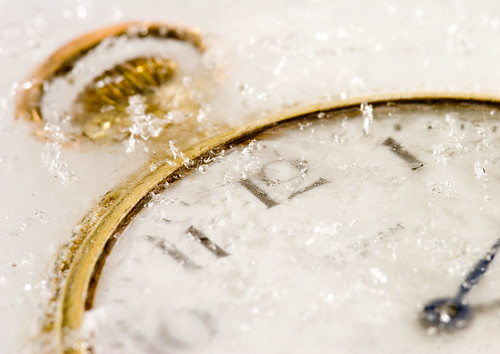But look! A friend writes with a question and my muse grew to such a length I thought I'd share it with you.
My friend Emma writes:
"hi guys, this is an odd query but I am writing a children's story in which time will stand still for a number of minutes/hours. I have tried looking up stuff relating to the physics of timelessness/time stopping/the illusion of time and am not ashamed to admit I was completely confused! I thought you might have some ideas...if time was to stand still, what would the effect of that be on the world?
any ideas would be much appreciated!
em"
Ah, Time. As The Doctor once said "I do wish I had the time to explain dimensional transcendentalism to you". Then again, he also said "Don't move! Or I'll kill this man with this deadly jelly baby", so maybe he was just balmy.
The notion of "stopping" time makes certain assumptions which may have a dramatic consequence for your story. First, stopping time relative to what? If you say "Lucy froze. Time ceased to flow for five minutes; her dropped porcelain cup suspended in the air, surrounded by a nimbus of oblately spherical droplets of tea, except for one somewhat larger blob which, at the point of motionless, had assumed a shape not unlike a cow's amygdala as it attempted to leave the cup, the metaphysical significance of which would never be detected, let alone debated by philosophers.", then her timeless state enduring for "five minutes" can only have any sense if there existed an "outside reference point" by which to have measured the interval. We commonly ascribe God as inhabiting this realm "outside time", also accounting for his ability to "see all of time at once" and unerringly picking next week's Powerball numbers.
As for poor Lucy, if time stopped for her for any stretch of (outside reckoned) time, by rights she should be entirely unaware of the phenomenon. For all you know, God popped the Universe on pause half way through you reading that last sentence to go to the loo, paused it for a million years in fact, and only just came back then and pressed play again. Did you notice? How could you? It's like another gedankensexperiment: "Imagine you wake up tomorrow and every atom in the universe is twice the size". How do you tell without a reference point?
Descending from the heavenly sphere for a moment, there is a scientific analogue: Relativity. Einstein's theory suggests that time does not flow equally fast for all observers in the universe. The flow of time for an observer can differ from his observing twin if he is subjected to an intense gravitational field, or subjected to acceleration at close to the speed of light. Doubtlessly this conjecture will be tested by the Mythbusters team in due course, but the physics are reasonably well established. Read this synopsis for Heinlein's "Time for the Stars" for a typical fictional treatment of this phenomenon. At the extreme end (for instance, close to the event horizon of a black hole) a clock dropped towards a black hole will appear to an outside observer to tick ever more slowly, and even freeze. However, it must be stated that to the other participant, time seems to flow normally, and will even observe the reverse effect (the other twin's clock ticking more and more quickly). Einstein, despite never wearing socks, seems to have had the physics down-pat.
One favourite plot device used by "time freezing" stories involves only a "partial freeze". Our protagonist freezes time and yet retains the ability to move about - rearranging people or objects for comedic effect, for example. A classic example of this scenario is from an episode of the Twilight Zone I vividly remember from when I was 13.
Dramatically, this is entertaining. From the standpoint of physics, it's a muddle. What atoms are "frozen" in such a partial freeze and which aren't? In theory, our non-time-frozen subject could not move or breath, as the atoms of air through which she moves would be fixed and immobile. I recall a CS Lewis story where a character could not walk across a lawn of time-frozen grass because each tender blade, being locked in place, was now like a knife.
Lastly, there's the sneaky-cheat way of stopping time. If you want a character or scene frozen for a "span" that has some meaning to some outside observer, maybe stopping time isn't what you need. All you need to do is render motionless each atom in your tableau, preventing chemical or physical interactions from occurring; effectively stopping entropy (the tendency for things to fall into disorder) in a localised space, for a time, even though time itself is still flowing. If such a situation could be engineered, I would imagine the people therein would say time froze for them, although the persistence of conscious thought during such an interruption would make a fascinating debate between those who place the conscious essence in the metaphysical realm and those who tie it to the atoms bumping about in your head.
I hope this meandering muse helps you formulate your story. I wonder what others will have to say?
Regards,
Nathan


1 comment:
Why hello.
Post a Comment